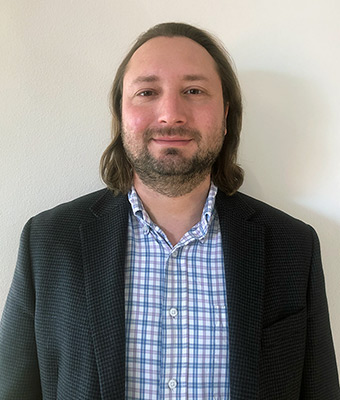Native American leaders to discuss tribal sovereignity
January 31, 2019

Ted Gordon, visiting assistant professor of sociology at CSB and SJU.
Leaders from three Native American tribes will join two college professors for a panel discussion on “Native Activism and Autonomy: A Conversation with Tribal Leaders on Tribal Sovereignty” at 7 p.m. Tuesday, Feb. 5 at the Centenary Room (room 264), Quadrangle Building, Saint John’s University.
The event, sponsored by the Eugene J. McCarthy Center for Public Policy and Civic Engagement and Ted Gordon, visiting assistant professor of sociology and first-year seminar at the College of Saint Benedict and SJU, is free and open to the public.
The panel will discuss American Indian tribal sovereignty and the intersection of tribal, state and federal policy. The program will also encourage students and community members to promote the value of politics and our shared identity as citizens.
“This exciting event will be the first of its kind for Saint Ben’s and Saint John’s,” said Gordon, one of five panelists for the event. “The conversation with native leaders will highlight how tribal self-determination benefits both native and non-native Americans.”
Other panelists for the event include:
- Melanie Benjamin, chief executive of the Mille Lacs Band of the Ojibwe since 2012 and also from 2000-08;
- Cathy Chavers, tribal chairwoman of the Bois Forte Band of Chippewa and executive board member of the Minnesota Indian Affairs Council;
- Karen Diver, Faculty Fellow for Inclusion Excellence at the College of St. Scholastica and former chairwoman of the Fond du Lac Band of the Lake Superior Chippewa. She is a former special assistant to President Barack Obama for Native American Affairs;
- Tadd Johnson, director of the Master of Tribal Administration and Governance and professor of American Indian Studies at the University of Minnesota-Duluth.
Gordon is the author of “Cahuilla Nation Activism and the Tribal Casino Movement” (University of Nevada Press, 2018). The book investigates American Indian activism and its impacts on public policy and perceptions.
His book focuses on his research with the Cahuilla nations, who are indigenous to inland Southern California. The Cahuilla have a long tradition of challenging unjust colonial policies.
One of the Cahuilla nations opened a poker club that sparked a precedent-setting Supreme Court decision in 1987. California v. Cabazon Band of Mission Indians accelerated the tribal casino movement into a $30 billion industry. The book explores the impacts of this industry and the strategies Cahuilla nations use to strengthen their self-determination.
